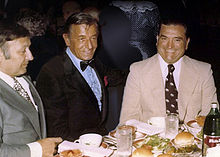Charles W. Sandman
Charles William Sandman Jr. (born October 23, 1921 in Philadelphia , Pennsylvania , † August 26, 1985 in Cape May , New Jersey ) was an American politician . Between 1967 and 1975 he represented the state of New Jersey in the US House of Representatives .
Career
Charles Sandman attended Cape May High School and then studied at Temple University in Philadelphia. During World War II , Sandman served as a pilot in the United States Army Air Corps . After being shot down, he spent seven months in German captivity. After studying law and being admitted to the bar in 1949, he began to work in this profession. Sandman also became the legal representative of the City of Cape May. At the same time, he began a political career as a member of the Republican Party . Between 1955 and 1967 he was a member of the New Jersey Senate ; in 1964 and 1965 he headed the Republican parliamentary group there. From 1956 to 1968 Sandman was a delegate to all Republican National Conventions . Between 1962 and 1967 he served as chairman of the New Jersey State Narcotics Investigating Committee . In 1966 he took part as a delegate to a meeting to revise the New Jersey constitution.
In the 1966 congressional elections , Sandman was elected to the US House of Representatives in Washington, DC , in the second constituency of New Jersey , where he succeeded Thomas C. McGrath on January 3, 1967 . After three re-elections, he was able to complete four legislative terms in Congress by January 3, 1975 . These were shaped by the events of the Vietnam War and the civil rights movement . 1973 Sandman ran unsuccessfully for governor of New Jersey. A year later, he was also not re-elected as Congressman, which was also a result of the Watergate affair that harmed many Republican candidates in 1974.
After his time in the US House of Representatives ended, Sandman lived in Cape May, where he died on August 26, 1985.
On the Justice Committee of the House of Representatives
Sandman was on the House Judiciary Committee when it voted on President Richard Nixon's impeachment , and was one of the President's defenders. Above all, Sandman criticized the "Articles of Impeachment", which he considered to be all too summary, and their lack of detailed and valid evidence of criminal acts by the President: "The evidence must be clear, it must be irrefutable, only these two terms count and nothing else:" Clear and irrefutable! " After the crucial tape recording appeared in July 1974, Sandman also withdrew all support for Nixon.
Web links
- Charles W. Sandman in the Biographical Directory of the United States Congress (English)
- Charles W. Sandman in the database of Find a Grave (English)
| personal data | |
|---|---|
| SURNAME | Sandman, Charles W. |
| ALTERNATIVE NAMES | Sandman, Charles William (full name) |
| BRIEF DESCRIPTION | American politician |
| DATE OF BIRTH | October 23, 1921 |
| PLACE OF BIRTH | Philadelphia , Pennsylvania |
| DATE OF DEATH | August 26, 1985 |
| Place of death | Cape May , New Jersey |

